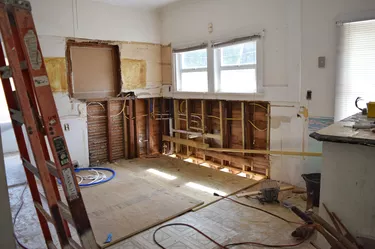
Tip
Research is very important. Trying to write compelling information without doing proper research will appear to be phony. Copy edit the documents to be submitted several times. Nothing looks worse on one of these applications than poor grammar.
Warning
Do not apply for a government grant for flipping houses unless you are prepared to live by the guidelines of receiving the money. Spending the money on something other than flipping houses could bring penalties.
Flipping houses, which is the process of buying a home that is in less than stellar shape and improving it to be sold for a profit, is something that has become more common in recent years. Applying for a government grant to flip houses does not necessarily mean that the grant will be given. While there are millions of dollars of grant monies given out each year, much of that money is given to nonprofit organizations and other government-related institutions. However, a person can increase the likelihood of being approved for a grant.
Step 1
Inquire about government grants for flipping houses with state and local governments, not the federal government. Much of the grant money the federal government gives out each year is earmarked before requests are even made for it. On the other hand, states and municipalities within states take a greater interest in granting money to people who want to beautify the communities within the area. Do the homework to find out which municipalities or states are setting aside money to redevelop certain areas. The best way to find this out is by calling the community and economic development office of a municipality to find out what programs might be in place that could lead to a grant.
Video of the Day
Step 2
Devise the plan. Once a firm understanding of which government entities that are able to give grant money is ascertained, it is important to develop a solid plan that will allow a person to show that his plan for flipping houses will be beneficial to the community. A person who is applying for a government grant to flip houses in a municipality might want to come to a city council meeting and make a brief comment during the "public comment" portion of the meeting about his desire to flip houses and beautify the area. Although the council does not directly make the decisions about who receives the grants, if a person is able to get the council excited about an idea, it will increase the likelihood of getting a grant.
Step 3
Write a clear, concise and succinct cover letter. To many in government, "flipping houses" is a nebulous term, and they do not understand exactly what it means. An effective cover letter will not only explain what flipping houses means, but also why it would be beneficial to the community as a whole. A municipality would be more likely to offer grant money to a person who is asking for a government grant to flip houses in an area that has been run down. The cover letter should be no longer than 3 or 4 short paragraphs. Include a summary of all of the things mentioned in the application. Many people find it helpful to write the cover letter last because they have a better idea of what exactly is discussed in the application.
Step 4
Write an executive summary. The executive summary should be about 2 pages long and should include the most important reasons why the grant is being applied for. It should also clearly spell out the basic things that will be done if the grant money to flip houses is received. For example, a person should not simply say that she wants to flip houses. Instead, she should define what the main things are that she will do to flip a house. Specifics can be discussed in the actual grant document, but the executive summary should let the approval office know what kind of general work will be done in a home to "flip" it. The things that could be done to flip a house include landscaping the yard, tearing down walls, replacing carpet and changing light fixtures.
Step 5
Write a need statement. The need statement is the meat of the application when applying for a government grant for flipping houses. The need statement should focus on why granting the money to the applicant will be beneficial for others. The more people a house being flipped can help, the more likely a person is to get grant money for doing it. This is why states and municipalities are more likely to give grant money to those who plan to flip houses in run-down neighborhoods.
Step 6
Write about other funding. A person asking for grant money for flipping houses who does not have other sources of income is very unlikely to receive a grant. Those who issue these grants want to make sure that the person or organization receiving the grant will be able to operate (even without grant money). If a person shows that he is willing or has been willing to seek funding from other sources, those who award grants will look more favorably upon him.
Step 7
Make a budget and a time line. By creating a budget and a time line that assumes the grant money will be awarded, those who make the decision about awarding the government grants for flipping houses can get a better idea of what will be accomplished if the money is awarded. In addition, if the goals on the time line are reached, the applicant is more likely to be awarded another grant in the future because of his ability to responsibly use the grant money given.
Video of the Day